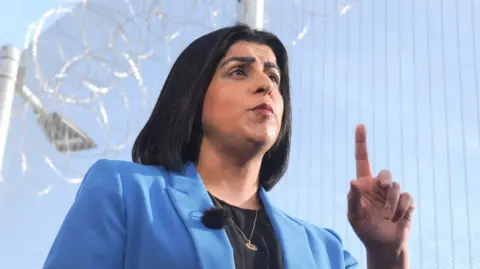Justice Secretary Shabana Mahmood has recently emphasized the necessity for accountability among those who ignored the severe issue of grooming gangs in the UK. With a stark promise of a “moment of reckoning,” Mahmood highlighted the disconcerting reality that no actions were taken following the extensive recommendations made in 2022 by Professor Alexis Jay’s Independent Inquiry into Child Sexual Abuse (IICSA). Following Labour’s victory in the July 2024 general election, these recommendations, which were crucial for addressing the extent of abuse outlined in the inquiry, went unimplemented.
Baroness Louise Casey is currently undertaking a review that aims to delve into the societal and cultural factors contributing to this abuse. The government has claimed that this review will finish shortly, which indicates an accelerated pace in addressing these long-standing issues. However, calls for a fresh national inquiry are being rebuffed, as the government maintains that its focus remains on the prior recommendations made by Professor Jay.
Several political figures, including Conservative leader Kemi Badenoch and Nigel Farage from Reform UK, have expressed support for a new national inquiry that would possess the authority to compel witnesses to testify. This initiative aims to identify and hold accountable any individuals or institutions that may have concealed incidents of child sex abuse associated with grooming gangs. The discussion around this inquiry included challenging statements from Home Secretary Yvette Cooper, who was pressed about the government’s rejection of a broader inquiry and its perceived sluggishness in acting on previous recommendations.
Addressing the situation, Mahmood conveyed an acknowledgment of the seemingly systemic failures that have left many victims feeling unjustly treated. While there have been legal actions against the perpetrators, she indicated that many survivors feel the justice received does not compensate for the years of neglect and oversight by the authorities. Mahmood articulated the critical need for deeper reflection on why such large numbers of individuals turned a blind eye. She suggested that the criminal justice system’s actions, though necessary, still left a profound gap in terms of proper accountability for the victims of grooming gangs.
The scope of the inquiry identified widespread shortcomings across various institutions responsible for safeguarding children’s welfare, including social services and law enforcement agencies. Mahmood expressed that trust has been fundamentally undermined, positing that the lack of accountability in these sectors has resulted in “visceral pain” among the affected individuals. Furthermore, the ongoing audit conducted by Baroness Casey will investigate the demographics and characteristics of offenders, especially after Prof Jay highlighted a troubling trend of inadequate documentation regarding the backgrounds of many perpetrators, most of whom are of Pakistani descent.
While funding for local inquiries, such as those in Oldham, demonstrates some movement towards addressing these issues, consistent resistance remains against calls for a more comprehensive national inquiry. The government clarified that their priority is not launching a new inquiry but rather implementing the existing recommendations.
In reflection of the broader landscape of political engagement regarding the scandal, it is clear that the claims and testimonies of victims have not been adequately addressed, leading to calls for a more profound national reckoning. Mahmood’s insistence on accountability is indicative of a pressing moral and political obligation to not only provide punitive measures for those culpable but also to restore faith in institutions tasked with ensuring the safety and wellbeing of the most vulnerable in society.



